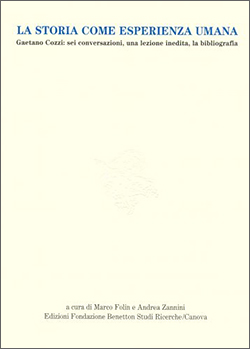
La storia come esperienza umana
Gaetano Cozzi: sei conversazioni, una lezione inedita, la bibliografia
[History as human experience. Gaetano Cozzi: six conversazioni, an unpublished lecture, the bibliography]
edited by Marco Folin and Andrea Zannini
Fondazione Benetton Studi Ricerche-Canova
Treviso 2006
XII-172 pages
17 photographs
euros 15
This collection of pieces introduces the reader to the subjective journey by which Gaetano Cozzi throws light on his long career as a historian, moving freely in time and space to touch on a wide range of scientific and human interests, and adds a number of new insights into the adventure in the metamorphosis of ideas and experiences that took him from the study of law to the study of history. The material provides telling illustrations of the patient probing, the sudden changes of direction, the doubts and dilemmas that were part of the metamorphosis. In his distinctive voice, the great historian gives a personal, anecdotal account of the meetings and discussions that provided the ferment of ideas underlying his own development.
The writings cast light from inside (albeit on part at a time) on the system of ideas that sustained and guided Cozzi’s historical research, structured around a complex dialectic of conflicts and contradictions between polarities that might appear to irreconcilable. He much preferred people and institutions that do not seek to conceal or to deny or to devitalize such conflicts with opaque half-way compromise but rather to acknowledge their inherent strain and to devise new frameworks and institutions that bring about changes in the behaviour of people, societies and states and refashion the rules that govern relations between them. The polarities he addresses are not confined to historical matters; for Cozzi, the issues that crop up in archival documents are always and inextricably related to life and personal experience: polarities between those who exercise justice and those to whom it is administered, between those who make the laws and those who put them into practice, between the State and the Church, between public ethics and personal interest, between religious and secular approaches, between liberalism and socialism, between libertarian radicalism and the pervasiveness of the State, between ruling power and ruled society, between “Venetianness” and “Italianness”, between the lord and the people, between city and country. Even his life as a commuter between Venice and Zero Branco in a way reflects his masterly dialectic approach, his taste and the critical intelligence with which he came to grips with contradictions and sought in them the salt of the earth.
Contents
Introduction by Domenico Luciani, p. VII
Gaetano Cozzi, A historian between law and justice. Experience from research, 1
Conversazioni, edited by Marco Folin, 13
1. Zero Branco, 5 January 1997, 21
2. Venice, 26 January 1997, 29
3. Venice, 3 March 1997, 43
4. Venice, 29 June 1997, 65
5. Zero Branco, 22 July 1997, 75
6. Zero Branco, 3 August 1997, 91
Illustrations, edited by Francesco and Elisabetta Cozzi, 113
Bibliography of Gaetano Cozzi, edited by Andrea Zannini, 129
Index of names and places, 159
Marco Folin (Venice, 1969) teaches Urban and Regional History at the University of Genoa, with special reference to the Renaissance and the city of Ferrara, on which he has published several essays and a book (Rinascimento estense. Politica, cultura, istituzioni di un antico Stato italiano, Laterza, Rome-Bari 2001). Recently he edited Sistole/Diastole. Episodi di trasformazione urbana nell’Italia delle città, Istituto Veneto di Scienze, Lettere ed Arti, Venice 2006. In the field of XX century Italian history he has published a collection of first-hand accounts of a Nazi mass execution (Popolo se m’ascolti… per le vittime dell’eccidio del Padule di Fucecchio, 23 agosto 1944, Diabasis, Reggio Emilia 2005) made two documentary films: Eccehomini. Ricordi di una strage (with Lorenzo Garzella and Filippo Macelloni, 1999) and Lelio Basso e i ribelli dell’Amiata (with Vincenzo De Cecco, 2003).
Andrea Zannini (Mestre, 1961) teaches Modern History at the University of Udine. His works on the economic and social history of the Venetian Republic include Burocrazia e burocrati a Venezia in età moderna: i cittadini originari (sec. XVI-XVIII), Istituto Veneto di Scienze, Lettere ed Arti, Venice 1993) and he has contributed to various volumes of the Storia di Venezia published by the Istituto della Enciclopedia Italiana. He has also carried out research in the field of Alpine demographics and the history of emigration, participated in the Fondazione Benetton Studi Ricerche project “From the Veneto foothills to southern Brazil” (supervisor Gaetano Cozzi, coordinator Daniela Perco) and published, together with Daniele Gazzi, Contadini, emigranti, “colonos”. Tra le Prealpi venete e il Brasile meridionale, storia e demografia, 1780-1910, Fondazione Benetton Studi Ricerche-Canova, Treviso 2003. His latest work concerns the history of climbing (Tonache e piccozze, CDA, Turin 2004) and the teaching of history (together with Walter Panciera: Didattica della storia, Le Monnier, Milan 2006).
